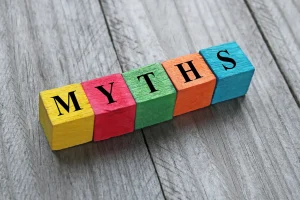One of the first things that people say when they are going into a divorce is, “I’m going to lose everything,” or, “They will get half of everything I own.”

While the division of property is an essential part of a divorce, in Florida, it is not that simple—in fact, a lot of things people believe to be true are not actually true when it comes to the division of property in a divorce. Here are some common myths or misbeliefs about equitable distribution in Florida.
1. If you buy something during the marriage but it is only titled or held in your name, it cannot be divided in your divorce.
This is a myth. Divorce court does not just look at whose name is officially on any title, or which spouse bought an item, or how a bank account is titled. A divorce court cares more about equity—doing what is fair.
Any property can be marital property and, thus, subject to division if it is treated that way.
For example, imagine a wife gets an inheritance from her mother and keeps it in an account in her name. During the marriage, the couple uses that inheritance money to add a room to the marital home, help start the husband’s business, and pay off marital debt.
The wife’s inheritance money has now become marital, subject to division, even though it isn’t titled in the husband’s name or in any bank account with his name on it.
If you want to keep any property (including an inheritance) truly non-marital, it needs to be properly segregated into a separate account and not used for joint marital functions or purposes.
2. Only assets purchased or acquired while the parties are married can be divided
This is false for the same reason given above. The court does not just look at when the property was acquired (although it is a factor that can be considered by a court when deciding how much of a given asset either party gets).
The fact that property was acquired before marriage may mean that there is a presumption that it is not marital property. But that presumption can easily be lost when the property is commingled with marital assets or used for the benefit of the marriage.
For example, imagine a husband has a business, long before he is married. He gets married, and money from the business helps pay marital bills, and the wife contributes her time to help the business grow, the business pays for the family car, and the couple gives up opportunities, so that the couple can put more money into growing the business.
That business, although formed before the marriage, has now been sufficiently intermixed with the marriage, such that it can now be seen as marital property, subject to division.
Even just part of non-marital property, acquired before marriage, can become marital. For example, an investment that a spouse had before marriage may be nonmarital—but the increase in value of the investment that occurred during the time the parties were married could be considered marital and subject to division.
3. Everything will be shared or divided evenly
All property in a Florida divorce will be divided fairly (that is, equitably). But that doesn’t mean equal. What is fair may be unequal. The divorce court does not just take every piece of property and divide it in half.
A court will look to both the needs of the parties going forward, as well as their contributions to the asset that helped it exist or appreciate in value. The court will look to which spouse’s labor and working hours, helped the asset appreciate in value.
Property can even be used to balance out other issues in a divorce. So, for example, if the wife needs a significant amount of alimony or other support, and the husband cannot financially provide it, the husband may give up some of his interest in an asset to make up for the inability to pay alimony. Or, if the wife may take on the obligation to pay a lot of marital debt, while the husband may give up more property than he otherwise would have, to compensate the wife for taking on that debt burden.
4. A gift from one spouse to another cannot be divided
This is generally not true. In some circumstances, it may be. Again, the question is whether the gift truly is for the benefit of only the receiving spouse.
If the husband gets the wife diamond earrings for her birthday, then yes, those earrings could likely be considered a gift for just the wife, and thus, not marital.
But imagine a wife gives her husband a car for his birthday, and the car is used for both spouses to go to work, pick up kids, run errands, etc. Although a gift from wife to husband, the asset is really benefiting both parties, and the marriage in general, and thus, could be subject to division.
5. You are not liable for debts that your spouse agrees to pay
Let’s not forget that in a divorce, it is not just assets that are divided—debts and liabilities get divided as well. Sometimes, getting the other spouse to be obligated for a debt is as valuable as getting an asset in the marriage.
The problem with saying in, say, a settlement agreement or divorce judgment, “The wife will pay the credit card bill,” is that the creditor doesn’t care what your divorce agreement or mediation agreement or court judgment says. As far as the creditor is concerned, that credit card bill was and still is in both of your names and thus, the creditor can sue either one of you (or both) for that debt.
That means that if you have a debt in your name, and your spouse agrees to pay it in the marital settlement agreement or after mediation, and he doesn’t pay it, the creditor can still come after you—or worse, when it comes to things like mortgages, the creditor can foreclose on the property.
You can certainly take your (now ex) spouse to court to try to get him to pay or to enforce your agreement. But in the meantime, if a creditor comes after you, saying, “my ex was supposed to pay that as part of our divorce agreement,” it will not stop, or serve as a defense, to the creditor’s collection activities.
Anthony J. Diaz is an experienced family law attorney focusing on Mediation and Collaborative Divorce. His offices are located at 2431 Aloma Ave Suite #124, Winter Park, FL. 32792 and 3720 Suntree Blvd., Suite 103G, Melbourne, FL. 32940.
You may contact Anthony Diaz by calling 407-212-7807 or by email an*****@************aw.com or visit anthonydiazlaw.com for more information.
And if you found this article helpful, please leave us a review HERE.
Anthony Diaz is a Family Law and Collaborative Divorce attorney, mediator, speaker and coach in Orlando. Known as The Peacemaker, his practice specializes in divorce with dignity, mediation, collaboration, uncontested and out-of-court options to help families find peaceful solutions.
With over 20 years of experience, Anthony is passionate about helping his clients resolve conflict, reduce stress and move peacefully through the divorce process without going to court. He has helped thousands of families experience a more positive outcome.
As a Florida Supreme Court Certified Family and Circuit Civil Mediator, a State Qualified Arbitrator, and an esteemed member of the Leadership Academy of the International Academy of Collaborative Professionals, Anthony’s expertise in mediation and conflict resolution makes him uniquely qualified to help couples navigate the emotional and financial challenges of divorce.
He is an active and highly respected professional in the Florida collaborative community. Anthony serves as Co-Chair of the Florida Academy of Collaborative Professionals Outreach Committee and is a Board Member of the International Academy of Collaborative Professionals.
Prior to opening his private practice, Anthony was a CPA and an Assistant State Attorney for the Ninth Judicial Circuit of Florida. He earned his degree at Stetson University College of Law.
Anthony is also a published author, co-authoring Faces Behind the Pages and Creating Relationships and Family with Courage and Compassion. His solo works include:
• Divorce With Dignity – 3 Powerful Steps to Heal and Move Past Your Divorce N.O.W.
• !n-joy Your Relationships! – 7 Pillars to Deepening Your Connections With Passion and Purpose
• Moving Consciously Through Conflict – 5 Meaningful Steps to Mediating Conflict With Compassion
As a coach and an international speaker, his passion, mission and purpose is to help families move on from their divorce with dignity and embrace a more peaceful future.

